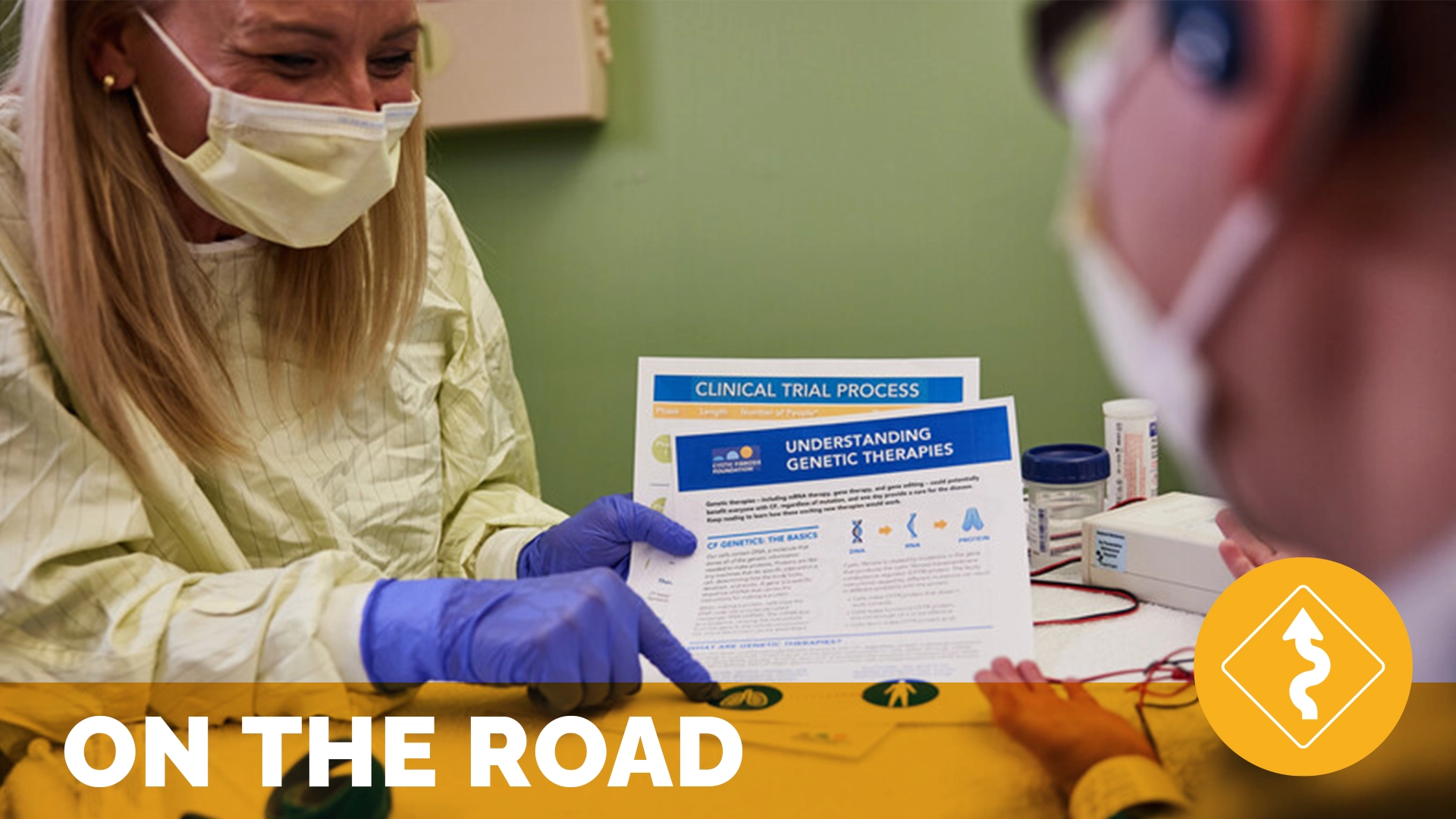Transforming Lives: A Journey of Compassion and Advocacy

On the Road with the Cystic Fibrosis Foundation – February 2024
by Stacy Palmer, CPXP
I recently had the opportunity to travel to Bethesda, Maryland to meet with the Cystic Fibrosis Foundation, a non-profit organization dedicated to supporting individuals with cystic fibrosis (CF) by funding research and drug development, partnering with the CF community, advancing high-quality, specialized care, and ultimately curing the disease.
The Cystic Fibrosis Foundation is an organization very close to our hearts at the Institute, as our dear friend and colleague, Tiffany Christensen, was a person living with cystic fibrosis and a passionate advocate. Tiffany, who passed away in March 2023, was the ultimate champion for the lived experience. She worked relentlessly to ensure the voices of all whom healthcare serves are heard, respected, and acted on. She was unwavering in her commitment to elevating conversations on equity. She was an unparalleled voice for all healthcare could do to be just a little better each day. And in doing all this, she made us all a little better each day too.
In Tiffany’s honor, and in support of her passion to impact the lives of all people with CF, we want to highlight the incredible work of the Cystic Fibrosis Foundation.
CF primarily affects the lungs and digestive system, causing thick mucus to build up and leading to severe respiratory and digestive problems. There are nearly 40,000 people living with cystic fibrosis in the United States and n estimated 105,000 people have been diagnosed with CF across 94 countries. Cystic fibrosis can affect people of every racial and ethnic group.
The Cystic Fibrosis Foundation works toward improving the lives of those with CF by funding research, providing patient support, advocating for policies that benefit those with CF, and raising public awareness about the disease to improve understanding and support. The Foundation collaborates with researchers, healthcare providers, drug manufacturers, and the CF community to advance treatments and improve the quality of life for those living with this condition.
Improving Clinical Care
My visit began meeting with Bruce Marshall, MD, Executive Vice President and Chief Medical Officer, highlighting areas of progress and ongoing efforts of the Foundation to enhance patient outcomes and quality of care. Marshall explained the shifting demographics of people with CF as survival rates improve, “When I started in CF care in the late eighties, median age of survival for a newborn with CF was late twenties, maybe 30. Now it’s approaching 60.”
This improvement can be attributed to a combination of CFTR modulator therapies, which address the underlying cause of CF, quality improvement, and symptomatic therapies that have emerged resulting in many adult patients coming into care, often in great shape. It has led to an expansion of CF care, once anchored in pediatrics, to support the growing number of adults receiving care and support. As people with CF are living longer, there’s a focus on how we can integrate primary care into CF care model [1], and expand the care team to include specialists such as gastroenterologists, endocrinologists, and mental health professionals.
Marshall shared several of the programs and efforts in place that have positively impacted patient care, quality of life, and survival:
Care Centers
The Foundation accredits and provides funding for more than 130 CF care centers, both pediatric and adult, located at hospitals across the country. The centers emphasize team-based care, including social workers and mental health coordinators, to ensure a holistic approach to managing this complex chronic disease. Each center undergoes a periodic full-day site visit from a peer Program Director to evaluate their facilities and practices, and to identify and address opportunities for improvement. Care centers that demonstrate a commitment to improving their quality of care are recognized publicly through Quality Improvement awards.
Care Centers are encouraged to implement the Foundation’s short Experience of Care survey in addition to the Hospital Consumer Assessment of Healthcare Providers and Systems (HCAHPS) or other standard organizational surveys. Marshall noted that feedback is typically positive, but suggestions for improvement are also submitted.
The high quality of specialized care available throughout the care center network has contributed to the improved length and quality of life for people with CF.
Patient Registry
Care Centers also contribute to the CF Foundation Patient Registry [2], which collects information on the health status of people with the disease to create CF care guidelines, assist care teams in providing care, and to guide quality improvement initiatives. Care centers also use the data to benchmark their programs against their peers. “The patient registry is one of our crown jewels,” said Marshall. ” It’s an amazing resource not just for clinical care, but also for real world research and designing clinical trials.”
While the registry has historically addressed CF from a clinical perspective, the Foundation is working on the next generation of the registry that will likely include social determinants of health.
Newborn Screening
One significant breakthrough in CF care is CF screening of newborn infants. The universal adoption of CF newborn screening allows for care and treatment to start earlier, which can delay disease progression. “If CF is not detected early by newborn screening, it may present as failure to thrive,” said Marshall. “Before implementation of newborn screening across the US, many of these kids were in really bad shape at the time of diagnosis.”
The Foundation is now advocating for more comprehensive genetic screening protocols to better encompass diverse populations, who are more likely to have rare variants that cause CF and that might not be picked up on a traditional newborn screening panel. This includes working on equitable access to early diagnosis and intervention for CF, especially for underrepresented Black and Hispanic individuals.
Through collaboration with the Foundation’s Policy and Advocacy team, Marshall’s team is developing updated newborn screening practice guidelines that we anticipate will be adopted throughout the United States.
Partnering for Patient-Centered Care
I also had an opportunity to meet with Cynthia George, Senior Director, Partnership for Sustaining Daily Care, to learn how the Foundation is working to improve the daily lives of individuals living with CF. George reflected on being in the field of cystic fibrosis for more than two decades, as she witnessed the lifespan of those living with CF increase to mid to late adulthood.
George shared about reframing the approach to CF management, moving away from terms like “adherence” and “compliance” to focus more on supporting patients’ daily lives. This reframing was specifically driven by listening to the voices of those living with CF to build true partnerships in care. There’s an emphasis on better communication between care teams and people with CF using various training programs and interventions to enhance these interactions.
“To see that progress is really amazing, and to be part of it is amazing,” said George. “My role here in the last 10 years has been to help reframe how we talk about and develop resources around sustaining the very burdensome treatment regimen required for living with CF. Today, things are different, but there’s still a lot of burden to managing CF, whether it’s taking your medicines or dealing with the equipment or the insurance companies and the pharmacies.”
Partnership Enhancement Program
Hearing adults with CF and parents state they needed better conversations about care topics, the CF Foundation partnered with the Academy of Communication in Healthcare (ACH) to develop the Partnership Enhancement Program (PEP). Led by trained facilitators, PEP is communication training for care teams, encouraging better conversations by allowing space for open-ended questions to uncover what people want and need. This program aims to equip healthcare teams with the skills necessary to engage in meaningful conversations with people with CFs and families. By understanding the daily challenges and experiences of individuals living with CF, healthcare providers can offer more personalized and empathetic care.
Success with Therapies Research Consortium
George shared another prong of the CF Foundation’s partnership program. The establishment of the Success with Therapies Research Consortium (STRC) reflects the commitment of the CF Foundation to engage people with CF, families, and healthcare providers in research on interventions that help people with CF navigate successful self-management of their daily care. People with CF and family caregivers serve In a variety of capacities including co-investigators, members of the consortium governing body, co-chairs of research working groups, protocol reviewers, and advisors on study design.
Beyond Clinical Care – Supporting People Living with CF and Their Families
I also had the chance to meet with Anne Willis, Senior Director of Health System Innovation and Navigation, to learn about the Foundation’s efforts to bridge the gap between clinical experience and community support for people with CF. Her team helps with one-on-one patient assistance, supporting care teams, and translating needs and opportunities to address through policy and care initiatives.
The one-on-one assistance is delivered through a program called Compass. Compass helps individuals navigate insurance and financial issues related to healthcare costs, assists in finding resources for various needs (e.g., paying copays), and even connects them with community organizations for help.
The program has expanded to address broader barriers to care, such as housing, food insecurity, and transportation needs. “Whatever people are dealing with, we try to find community organizations or resources that already exist to try and help them,” said Willis. “And we take what we hear through Compass and from care teams and identify trends and potential problem areas and try to see if there are solutions to fixing those problems.”
Another resource available is the CF Legal Information Hotline which assists with legal questions related to government benefits, school, and work accommodations, and specifically supports people with CF in navigating Social Security Disability applications. Willis shared, “Applying for disability is a very complicated process, and the firm managing the hotline knows CF inside and out and is able to help people navigate that.”
Willis also spoke about the Foundation’s focus on addressing equity, racial justice, diversity, and inclusion – an effort that closely aligns with a commitment in The Beryl Institute’s Declaration for Human Experience: We commit to acknowledge and dismantle systemic racism and prejudice, tackle disparities, and provide the highest-quality, most equitable care possible.
In 2020, an effort was launched by the Foundation to co-create recommendations with external advisors (ranging from people with CF to care team members) to ensure all individuals with CF have the opportunity for optimal health outcomes. Through these recommendations, the Foundation aims to address disparities in initial CF diagnosis, support care teams in providing equitable care, enhance diversity in clinical trials, and raise awareness of disparities through data analysis and reporting. “A very granular example is in our registry highlights report,” said Willis. “In the most recent one, we broke out race and ethnicity to show the diversity among people with CF. This data can help dispel misconceptions about who can have CF among medical professionals who were not aware of the diversity and dismissed symptoms in people of color that could have led to faster diagnosis and treatment.”
Partnering with the CF Community
Reinforcing the Foundation’s commitment to inclusivity and equity, Sue Sullivan, Vice President and Head of Community Partnerships, discussed the challenges of ensuring that everyone feels heard and valued within the CF community while highlighting successes in building trust and engagement with underrepresented groups. A former nurse taking care of adults living with CF in a care center setting Sullivan joined the Foundation in 2020. She stated, “It was when the social and racial reckoning in this country got the appropriate time to spend on looking through the lens of who aren’t we listening to?”
As part of the Foundation’s commitment to partnering with the CF community, the organization offers a virtual opportunity, called Community Voice, that enables people with cystic fibrosis and their family members feedback on various aspects of CF research, care, and programs. The program helps the Foundation ensure time and energy are spent on the things that matter the most to those living with CF or caring for someone with CF. The program also helps to inform research-specific projects. Often findings from Community Voice projects lead to a deeper dive through a focus group or working group.
Patient perspectives are also brought in to help shape clinical guidelines. “Then we bring in clinicians and researchers who are at the care center at the ground level and the appropriate expertise within the Foundation,” said Sullivan. “They’re all then working around a common goal to make sure that people with CF have the opportunity to have advanced quality, specialized CF care.”
An important aspect of the work is recognizing the need to address disparities and involve various demographics more effectively. Sullivan shared one example to develop a set of recommendations specific to Black people living with or impacted by CF. “Through a proud partnered effort, they helped write a set of recommendations that would impact their ability to have fair and equitable health outcomes,” she said.
Quality Improvement and Innovation
The last interview for this visit was with Kathy Sabadosa, Senior Director of Quality Improvement and Innovation. Sabadosa has a personal connection to the cause as a parent of an adult with cystic fibrosis.
She shared another way patient voice is captured in relation to the care center experience. The Foundation sends surveys every 90 days to those visiting CF clinics, gathering real-time feedback from patients and families. The data collected influences care quality, especially in areas like infection prevention and control, and fosters a community of champions who share peer-to-peer insights.
Reinforcing the focus on equity and inclusion shared by others, Sabadosa highlighted the focus on ensuring survey data is representative of the CF population. “We take our demographic data and compare it to the patient registry data to be sure the feedback we are hearing on a national level mirrors folks in our patient registry.”
Sabadosa also highlighted the impact of the medication Trikafta ® on her son and others living with CF, “Ninety percent of people with CF are clinically eligible to take Trikafta. It corrects the underlying defect of the CFTR modulator and, my gosh, it was like a light switch,” she shared. “When people started going on this medication, lung function could improve 20 percentage points.” She acknowledged the role the Foundation had in making that treatment available through its research efforts and commitment to improve the lives of those living with CF.
Circling back to part of my inspiration for this On the Road, a highlight of the conversation with Sabadosa was hearing her share about the impact of our dear colleague, Tiffany Christensen. “As a parent, I read a lot of Tiffany’s work and admired the way she embraced life and the way she navigated the healthcare system. She became a partner with that system to improve the experience of care for all people with CF,” expressed Sabadosa.
Tiffany made a significant impact on the CF community through her advocacy, storytelling, and work as a patient advocate. She was an inspiration to many, as is the work and dedication of the team at Cystic Fibrosis Foundation. We applaud the Foundation’s multi-faceted approach in supporting people with CF, addressing not only medical needs but also financial, social, and equity issues, ensuring a comprehensive support system for the CF community.
To learn more about the work of the Cystic Fibrosis Foundation, visit cff.org.
[1] Prickett MH, Flume PA, Sabadosa KA, Tran QT, Marshall BC. Telehealth and CFTR modulators: Accelerating innovative models of cystic fibrosis care. J Cyst Fibros. 2023 Jan;22(1):9-16. doi: 10.1016/j.jcf.2022.07.002. Epub 2022 Jul 22. PMID: 35879227.
[2] Boyle MP, Sabadosa KA, Quinton HB, Marshall BC, Schechter MS. Key findings of the US Cystic Fibrosis Foundation’s clinical practice benchmarking project. BMJ Qual Saf. 2014 Apr;23 Suppl 1:i15-i22. doi: 10.1136/bmjqs-2013-002369. PMID: 24608546.
Related content
-
 Patient Family & Community Engagement | Quality & Clinical Excellence
Patient Family & Community Engagement | Quality & Clinical ExcellenceCompassion Rounds: Connecting with Patients and Families Beyond a Diagnosis
2pm ET / 1pm CT / 12pm MT / 11am PT – During a hospitalization, medical rounds address the patient’s physical needs but often fall short of addressing emotional and spiritual needs. Compassion rounds is an innovative program that focuses on a patient’s mind, body and spirit. It assists families in finding hope, strength, and
Learn more -
 Innovation & Technology | Quality & Clinical Excellence
Innovation & Technology | Quality & Clinical ExcellenceVirtual Nursing: Improving Patient and Staff Experience
NewYork-Presbyterian is committed to excellence in patient care, research, education and community service. The virtual integrated program was piloted on 10 units across 2 hospitals for a five-month period. Due to its success in improving patient and nurse satisfaction, the program has since expanded across the enterprise. An interprofessional steering committee was created representing nursing,
Learn more -
 Patient Family & Community Engagement
Patient Family & Community EngagementDeclining a Qualified Medical Interpreter: Helping Patients Understand the Risks
By Tamara Cardoso, UConn Health At UConn Health, we are committed to putting patient experience at the center of our care. We recognize that delivering safe, high-quality, patient-centered care necessitates effective communication at every interaction. In healthcare, ineffective communication can lead to heightened anxiety, increased stress levels, and potential misunderstandings. Importantly, it can pose significant
Learn more
